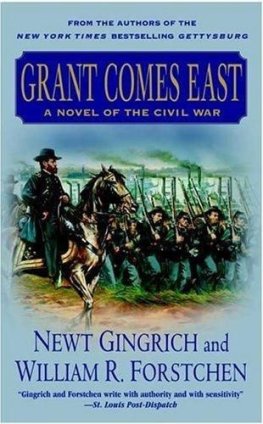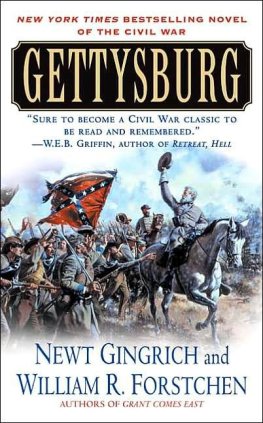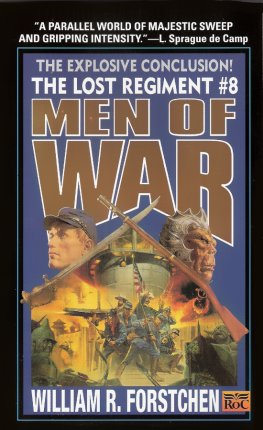William Forstchen - Grant Comes East
Here you can read online William Forstchen - Grant Comes East full text of the book (entire story) in english for free. Download pdf and epub, get meaning, cover and reviews about this ebook. genre: Science fiction. Description of the work, (preface) as well as reviews are available. Best literature library LitArk.com created for fans of good reading and offers a wide selection of genres:
Romance novel
Science fiction
Adventure
Detective
Science
History
Home and family
Prose
Art
Politics
Computer
Non-fiction
Religion
Business
Children
Humor
Choose a favorite category and find really read worthwhile books. Enjoy immersion in the world of imagination, feel the emotions of the characters or learn something new for yourself, make an fascinating discovery.
- Book:Grant Comes East
- Author:
- Genre:
- Rating:4 / 5
- Favourites:Add to favourites
- Your mark:
- 80
- 1
- 2
- 3
- 4
- 5
Grant Comes East: summary, description and annotation
We offer to read an annotation, description, summary or preface (depends on what the author of the book "Grant Comes East" wrote himself). If you haven't found the necessary information about the book — write in the comments, we will try to find it.
Grant Comes East — read online for free the complete book (whole text) full work
Below is the text of the book, divided by pages. System saving the place of the last page read, allows you to conveniently read the book "Grant Comes East" online for free, without having to search again every time where you left off. Put a bookmark, and you can go to the page where you finished reading at any time.
Font size:
Interval:
Bookmark:
William R Forstchen
Grant Comes East
Newt Gingrich
General Bob Scales, former commandant of the Army War College, came to the fore with his insightful analysis of what Lee, Grant, Sickles, and Lincoln would have been facing the "day after" a Confederate victory at Gettysburg and had a major influence in the shaping of our scenario.
Professor Leonard Fullenkamp of the Army War College has, yet again, shown to us his remarkable grasp of the 1863 campaign and offered invaluable help, along with Professor Dennis Showalter, former president of the Society of Military Historians.
Thanks as well to the brilliant historical artist Don Troiani, not only for his remarkable cover art but for his analysis of our work, and to the historian Steven Sears for his books on Chancellorsville and Gettysburg, which helped to shape our own theories.
So many others were involved as well. Kathy Lubbers, my (Newt's) daughter, who helped keep us organized and on task in what proved to be a highly complex project and, at times, a physically demanding one as well, especially we were out signing books at Gettysburg in hundred-degree heat. Randy Evans and Rick Tyler of my (Newt's) staff for handling so much of the detail work as well. A tribute as well for Paul Breier and Dr. George Talbot, two dear friends of Bill's, both devotees of history who encouraged him in his work and passed away just as this book was completed.
While out promoting Gettysburg last summer, we met new friends and were filled with admiration for those devoted to the study of the Civil War. So many of you offered excellent comments, suggestions, and criticisms that helped us in the shaping of this second volume. In particular we'd like to extend our thanks to the team of Hardtack amp; Wool, a Civil War educational firm that helped us organize the Gettysburg signing event, and the administration of Montreat College, which provided Bill with a year-long sabbatical, in part to research and work on this series. We must also thank the owners and managers of so many bookstores around the country that warmly greeted us and arranged events.
As always, our fear is that in mentioning some names we fear we might miss others. If we did not mention you here, know that nevertheless we are thankful for your help and support.
Of course, there are three major acknowledgments for our loving wives, Callista, Sharon, and Krys, who allow us time away from home and indulge us in our passion for history.
Finally, as always, for all those young men of a hundred and forty years past, North and South, who fought and, if need be, gave their lives for the causes they believed in. We believe that such strength and mettle are evident today with the men and women serving our nation on so many distant fronts. The bravery of the line infantry of both sides in the Civil War, the nobility of Lee, and the determination of Grant are clearly evident in those of you standing watch overseas. We are profoundly grateful to all of you, past and present, for your dedication and service to our country.
Chapter One
Cairo Illinois
July 16 1863
A cold rain swept across the river. To the east, lightning streaked the evening sky, thunder rolling over the white-capped Ohio River.
The storm had hit with a violent intensity and for a few minutes slowed the work along the docks, but already sergeants were barking orders at the drenched enlisted men while rain-soaked stevedores were urged back to their labors. Dozens of boats lined the quays, offloading men, horses, limber wagons, and field pieces.
To the eyes of Gen. Herman Haupt, commander of United States military railroads, the sight of these men was reassuring. They were the veterans of the Army of the Tennessee, the victors of the great campaign that had climaxed ten days ago at Vicksburg, a victory that had come simultaneously with what was now seen as the darkest day of the war, the day Lee defeated the Army of the Potomac at Union Mills.
The soldiers disembarking on the banks of the Ohio were lean and tough, their disciplined, no-nonsense carriage conveying strength and confidence despite their bedraggled, tattered uniforms, faded from rainy marching in the muddy fields of Mississippi, Louisiana, Arkansas, and Tennessee. Headgear was an individual choice. Most wore battered, broad-brimmed hats for protection against hot southern sun and torrential rains. Regulation field packs were gone; most were carrying blanket, poncho, and shelter half in a horseshoe-shaped roll, slung over the left shoulder and tied off at the right hip. Except for the blue of their uniforms, they looked more like their Confederate opponents than the clean, disciplined, orderly ranks Herman Haupt was used to seeing in the East. Few if any would ever have passed inspection with regiments trained by McClellan. These Westerners were rawboned boys from prairie farms in Iowa and Ohio, lumberjacks from Michigan, mechanics from Detroit, and boatmen from the Great Lakes and Midwest rivers. The unending campaigning had marked them as field soldiers. Spit and polish had long ago been left behind at Shiloh and the fever-infested swamps of the bayous along the Mississippi.
They already knew their mission pull the defeated Army of the Potomac out of the fire and put the Confederacy in the grave. They came now with confidence, swaggering off the steamboats, forming into ranks, standing at ease while rolls were checked, impervious to the rain and wind, their calmness, to Haupt's mind, a reflection of the man that he now waited for.
He could see the boat, rounding the cape from the Mississippi River into the Ohio, the light packet moving with speed, cutting a wake, smoke billowing from its twin stacks, sparks snapping heavenward, carried off by the wind following the storm. The flag on the stern mast denoted that an admiral was aboard, but mat was not the man Haupt was waiting for.
The diminutive side-wheeler, a courier boat built for speed, aimed straight for the dock where Haupt was standing, the port master waving a signal flag to guide it in.
Haupt looked over at the man accompanying him, Congressman Elihu Washburne, confidant of the president and political mentor of the general on board the boat Elihu, who had joined Haupt only the hour before, was silent, clutching a copy of the Chicago Tribune, out just this morning, its front page reporting the disaster at Union Mills, the advance of Lee's army on Washington, and the riots which had erupted in New York, Philadelphia, and Baltimore.
"I sure as hell am glad I don't have his responsibilities," Elihu sighed as the side-wheeler slowed, paddle wheels shifting into reverse, backing water in a dramatic display by its pilot, who had timed to the second the order to reverse engines.
Its steam whistle shrieking, the boat edged in toward the dock, half a dozen black stevedores racing along the rough-hewn planks, ready to grab lines tossed by the light packet's crew.
Ropes snaked out across the water were caught as the boat edged into the dock, brushing against it with a dull thump that snapped through Haupt's feet, the dock swaying on its pilings.
The stevedores tightened the lines, lashing them down to bollards, and within seconds a gangplank-was run over, slamming down on the deck.
There was no ceremony or fanfare, no blaring of trumpets, no honor guard racing down the dock and coming to attention with polished rifles. The door to the main cabin swung open and he came out.
Haupt had never seen this man before but he knew instantly who he was. He was short, grizzled-looking, with an unkempt beard of reddish-brown flecked with gray; his face was deeply sunburned, wrinkled heavily around the eyes, which were deep set and sharp-looking. His dark blue private's four-button coat free of all adornment except for the insignia of rank, which, Haupt quickly noted, was still that of major general in spite of his recent promotion. Slouch hat pulled low against the storm, he came down the gangplank and Haupt came to attention and saluted.
Font size:
Interval:
Bookmark:
Similar books «Grant Comes East»
Look at similar books to Grant Comes East. We have selected literature similar in name and meaning in the hope of providing readers with more options to find new, interesting, not yet read works.
Discussion, reviews of the book Grant Comes East and just readers' own opinions. Leave your comments, write what you think about the work, its meaning or the main characters. Specify what exactly you liked and what you didn't like, and why you think so.










